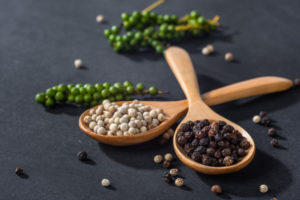Love it, hate it- but you can’t ignore the quintessential ingredient of this Indian spice– the black pepper!
Black pepper belongs to the family Piperaceae and the species is known as Piper nigrum. It is native to South India and researches show that black pepper has been used in Indian cooking as early as even 2000BC. With its popularity as prized trade commodity increasing- pepper soon found its way from India to faraway lands as Middle East, North Africa and Europe. Interesting stories reveal that black peppercorns were found stuffed in the nostrils of Ramesses II- as a part of the mummification rituals- to preserve the dead body. Pepper was so costly in those days that it was used as means of trading currency and some even termed it the “black gold”.
The etymology of pepper again refers back to India- the Dravidian languages which referred to them as “pippali”. After pepper travelled to Greece- the name soon changed to piper and then gradually over a period of time- the name Pepper came to place.
Medicinal uses:
The medicinal uses of pepper are exhaustive. It is known to improve the digestion process. The black pepper stimulates the taste buds that cause the stomach to secrete hydrochloric acid which aids in easier and quicker digestion. It is also known that the outer layer of the peppercorn stimulates the breakdown of the fat cells. In a recent study carried out by the University of Michigan Cancer Center, it is revealed that black pepper plays a crucial role in preventing the development of breast cancer tumours. Also- when taken combined with turmeric, its anti-cancer properties are heightened.
From the cosmetic point of view- pepper is found in scrubs- as it acts as a great exfoliant. When crushed and added as a scrub or when we use face scrubs that contain pepper- it is known to slough off the dead skin, stimulate circulation and deliver more oxygen to the skin. Black pepper is also a natural anti-depressant. Piperine present in black pepper acts as an anti-depressant and stimulates the nervous system- which results in an improvement in the cognitive capacity of the individual.

Apart from English medicines that widely prescribe the benefits of black pepper- Ayurvedic medicine and Chinese medicine also prescribe black pepper for improving digestion, curing bowel disorders and vomiting. Black peppercorns are found to be rich storehouses of potassium, calcium, zinc, manganese, iron and magnesium. They are also used in dentistry as an antiseptic for tooth-decay and gum swellings.
As is always advised- moderation in the choice of spices added to our meals is a must. And as they say- when in doubt- consult the doc! Find out if ingredients that you wish to add- would have any adverse effects on your body from your practitioner before you divulge in them. Black pepper, whose innumerable benefits have been listed above- has been proven to be adversarial for people with ulcerative colitis, stomach ulcers and other gastrointestinal disorders. To- find out before you eat!
Recipes:
Some of the famous recipes that have black pepper as the main ingredient are listed below:
- The most famous Tam-brahm recipes of Milagu Rasam and Milagu Kozhambu. Highly advised as a healing food for new moms.
- The indelible effect of pepper in another South Indian delicacy- the Ven Pongal.
- Peppercorn Upma/ Milagu Aval Upma.
- Mulligatawny soup- that you found served in most of the hotels derives its name from our own Tamil- Milagu Thaneer soup! And its got a taste very similar to Milagu rasam.
Apart from the above- they are added as a part of the ingredients in many recipes – especially in Indian cuisine. So go ahead- try them in your kitchen and share your views with us.
